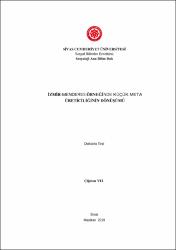| dc.contributor.advisor | Kocacık, Faruk | |
| dc.contributor.author | Yel, Çiğdem | |
| dc.date.accessioned | 2020-01-17T05:23:22Z | |
| dc.date.available | 2020-01-17T05:23:22Z | |
| dc.date.issued | 2019 | tr |
| dc.date.submitted | 2019-05-27 | |
| dc.identifier.other | XXV, 311 sayfa | |
| dc.identifier.uri | https://hdl.handle.net/20.500.12418/12136 | |
| dc.description.abstract | Bu doktora tez çalışmasında Türkiye’de kırsal dönüşümün İzmir ili Menderes ilçesinde küçük üreticilere etkisi konu edilmiştir. Araştırmada dünya genelinde egemen olan neoliberalizmin ve ülkemizin bu yönde şekillenen tarım politikalarının, kırsal dönüşümde belirleyici temel unsurlar olduğu savı ortaya konmuştur. Bu durum küçük üreticilerin sosyo-ekonomik yapısında (gelir, sermaye, emek) kötüleşmeye yol açmaktadır. Bu problemle ilişkili olarak, küçük üreticilerin neoliberal piyasa ekonomisi karşısında nasıl ayakta kaldıkları, ne gibi mücadele biçimleri geliştirdikleri; kendi içlerinde hangi yönlerden sınıfsal farklılaşma eğilimi gösterdikleri sorularına cevap aranmıştır. Araştırmanın kuramsal temelini küçük meta üretimi kuramı oluşturmaktadır. Araştırma bilimsel yöntemin ilkelerine göre gerçekleştirilmiş olup alan araştırmasında karma yöntem deseninden yararlanılmıştır. Bu anlamda araştırmada hem nicel hem de nitel veriler toplanmış olup nicel veriler için görüşme, nitel veriler için derinlemesine görüşme ve her iki veri için de gözlem teknikleri kullanılmıştır. Araştırmanın örneklemi 360 katılımcı ve 8 köy muhtarıdır. Araştırma sonucunda ortaya konan hipotez doğrulanmıştır. Buna göre küçük meta üreticilerinin, neoliberal politikalarla mücadele edebilmek için toprak, traktör, tarım aleti gibi temel tarımsal sermayelerini sattıkları, yani mülküzleştikleri; tarım dışında ek gelir getirici işlerde çalıştıkları, yani işçileştikleri görülmüştür. | tr |
| dc.description.abstract | In this doctoral dissertation, the impact of rural transformation on petty producers in Menderes, Izmir has been discussed. In this study it is asserted that neoliberalism, which is dominated worldwide, and the agricultural policies of our country shaped in this direction are the main determinants of the rural transformation. This leads to a derogation in the socio-economic structure (income, capital, labour) of petty producers. In respect to this problem, an answer has been sought for the questions on how petty producers survive against neoliberal market policy, what kind of solutions they develop to struggle and in what ways they tend to have class differentiations in themselves. The theoretical background of the research is based on the theory of the petty commodity production. The research was conducted according to the principles of scientific method and mixed method design was used in the field research. In this sense, both quantitative and qualitative data were collected and the interview technique was used in the quantitative data, the depth-interview technique was used in the qualitative data and observation technique was used for both data. The sample of research consists of 360 participants and 8 village headmen. According to our field research results, our main argument has been confirmed. Petty commodity producers had to sell their basic agricultural capitals such as soil, tractors, agricultural tools, which means they became dispossessed and because they work at additional jobs, they also became labourized. | tr |
| dc.language.iso | tur | tr |
| dc.publisher | Sivas Cumhuriyet Üniversitesi - Sosyal Bilimler Enstitüsü | tr |
| dc.rights | info:eu-repo/semantics/openAccess | tr |
| dc.subject | Kırsal Dönüşüm | tr |
| dc.subject | Neoliberalizm | tr |
| dc.subject | Küçük Meta Üretimi | tr |
| dc.subject | İzmir | tr |
| dc.title | İzmir-Menderes Örneğinde Küçük Meta Üreticiliğinin Dönüşümü | tr |
| dc.type | doctoralThesis | tr |
| dc.contributor.department | Sosyal Bilimler Enstitüsü | tr |
| dc.relation.publicationcategory | Tez | tr |















